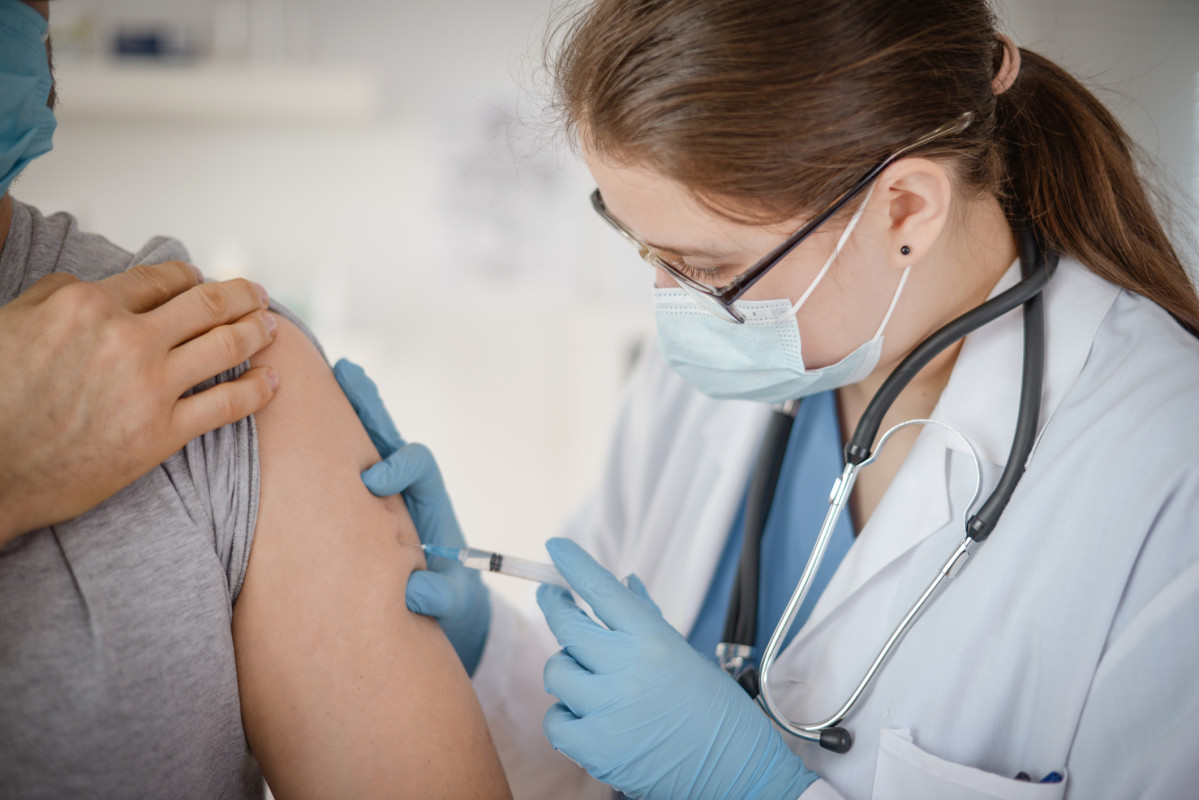
Your immune system’s job is to protect you from germs that cause diseases. But as you get older, your immune system tends to weaken, and you may be at a higher risk for serious illness. That’s why staying up-to-date on vaccines is crucial for keeping yourself healthy as you get older.
“Vaccines are a good deal in the sense of benefit versus risk,” explains Dr. Dokyoung Yoon, MD, a family medicine physician at MedStar Health in McLean, Virginia. “Vaccines can protect you from severe infections.”
🩺 SIGN UP for tips to stay healthy & fit with the top moves, clean eats, health trends & more delivered right to your inbox twice a week 💊
They’re also safe and effective, but if you’re concerned about getting one, talk to your healthcare provider about any concerns, says Dr. Ravi Kavasery, MD, an internist and senior vice president and chief medical officer at Blue Shield of California. The shot may bring some side effects, but they’re usually mild for most people.
Doctors “can provide personalized information and reassurance and develop the best action plan for your health,” he says.
If you’re over 50, doctors say there are a few vaccines that you should get this fall if you haven’t already.
The Most Important Vaccines to Get If You’re Over 50
The Centers for Disease Control and Prevention recommends people over 50 get certain vaccines. Here’s what you should know about each one:
The flu shot
Everyone six months and older, including adults, should get a flu shot every year. The flu virus changes from year to year, and with the vaccine, you’re less likely to get the flu, and if you do get it, you’re more likely to have milder symptoms, Dr. Kavasery says.
Related: The One Thing You Should Never, Ever Do Before Getting a VaccineIt’s especially important to get jabbed if you’re over 50 because this age group is at a higher risk for complications from the flu, says Yoshua Quinones, MD, an internist at Medical Offices of Manhattan and contributor to LabFinder.
Fall is the best time to get a flu shot since there are typically surges of the virus during the winter, explains Christina Aungst, PharmD. The CDC recommends three flu vaccines for people 65 and older: the Fluzone High-Dose inactivated flu vaccine, the Flublok recombinant flu vaccine and the Fluad adjuvanted inactivated flu vaccine.
“These are all designed to trigger a stronger immune response and provide greater protection,” as they can stimulate better antibody production and help fight off flu infections, Aungst says.
COVID-19 vaccine
The COVID vaccine is now an annual routine, Dr. Yoon says. “Even with the recent summer surge and some plateau recently, I see people getting COVID all the time.”
The CDC recommends everyone over six months get the latest COVID shot, which is updated to fight the current virus variants. Immunity wanes, so even if you got vaccinated last year, you should get the latest version this fall, Dr. Kavasery says.
“One of the significant risk factors of severe COVID infection is age,” Dr. Yoon says. “The COVID vaccine is well-known to protect against severe infection.”
Getting a COVID shot is especially important if you have underlying health conditions, Dr. Quinones says, adding that it can help protect you and others around you.
Shingles vaccine
Shingles is a viral infection—caused by the same virus as chickenpox—that brings a painful rash or skin blisters, according to the Cleveland Clinic. The CDC estimates that about a third of Americans will have shingles at some point in their lives.
Your risk for shingles increases with age, Aungst says, and getting vaccinated can help prevent the illness and its possible health complications, including long-term nerve pain, vision problems and pneumonia.
It’s recommended that adults over 50 get the two-dose Shingrix vaccine, which is given between two and six months apart, Dr. Yoon says. It may cause some mild side effects, such as pain in your arm, and he suggests planning to rest for a day or two after the shot.
Research shows that the vaccine is most effective in the first year and wanes over 10 years.
“The best time to get your shingles vaccine is your 50th birthday,” Dr. Kavasery says. But if you haven’t gotten it yet, this fall is a great time.
Pneumococcal vaccine
Adults over 65 should get the pneumococcal vaccine, which protects against pneumococcal disease caused by bacteria, Dr. Kavasery says. These diseases include pneumonia, ear infections, sinus infections, meningitis and blood infections, and older people (and children under 2) are at the greatest risk.
“The vaccine helps prevent serious illnesses such as pneumonia, meningitis and bloodstream infections, which can be particularly dangerous for older adults and those with health issues,” Dr. Quinones says.
There are a few different pneumococcal vaccinations, so it’s a good idea to talk to your doctor about which one is best for you, Aungst says. “Before getting these vaccines, it’s important to consult a healthcare professional for personalized advice and recommendations, as you may receive a specific kind of vaccine based on your prior vaccination history.”
RSV vaccine
Respiratory syncytial virus (RSV) is a contagious respiratory illness that typically causes cold-like symptoms, according to the Cleveland Clinic. People over 65, children under 5 and individuals with a compromised immune system are at a higher risk for RSV.
The CDC recommends an RSV vaccine for adults over 75 and those ages 60-74 who are at a higher risk for the illness, along with babies and pregnant women.
Related: The One Habit Doctors Are Begging You to Break ASAP If You Don’t Want to Get Sick This Fall
Three RSV vaccines are currently available, Aungst says. “It’s a good idea to get the RSV vaccine in the fall around the same time as your flu shot. They can even be administered together, which may be a convenient option.”
It’s a one-time vaccine, not something you need annually, Dr. Yoon says. The fall is a good time to get it, if you’re eligible, as it’s the start of RSV season, which extends through the winter, Dr. Quinones adds.
Td or Tdap vaccine
All adults need the Tdap (tetanus, diphtheria and pertussis) vaccine at least once. So if you didn’t get it as a teenager, now is a good time, Dr. Kavasery says. Then, you need a Td (tetanus, diphtheria) booster every 10 years, as your protection decreases over time, according to the CDC. So, talk to your doctor if you haven’t gotten the vaccine or need a booster.
What to Do When You’re Hesitant About Getting Vaccinated
Vaccines are essential for preventing serious illness, especially as you get older and see your immune system weaken, Dr. Quinones says. While vaccine hesitancy has come up more recently, vaccines are safe and effective—and they protect against serious illnesses like the flu, COVID, shingles, RSV and pneumococcal disease.
People have been getting vaccinated for decades. They’ve minimized illnesses and saved lives, Dr. Kavasery says. “Certain diseases have been eradicated, like polio. Vaccines are safe and help create protective antibodies to fight infection or disease. Vaccines can prevent severe illness and their long-term side effects.”
Don’t worry too much about side effects, he adds. While they can happen, side effects are usually mild for most people, and the benefits of the vaccine often outweigh the risks.
When he sees a patient who’s hesitant about getting a vaccine, Dr. Kavasery says he listens to their concerns and strives to reassure them. “Most of the time, they have heard some myths about vaccines, or someone on social media is spreading misinformation about the safety of vaccines.”
The available vaccines have been extensively researched and monitored for safety and efficacy, Dr. Quinones adds. “For those who are hesitant, it’s important to discuss concerns with your doctor, who can explain how vaccines work and address specific fears.”
Up Next:
Sources:
-
Dokyoung Yoon, MD, a family medicine physician at MedStar Health
-
Ravi Kavasery, MD, an internist and senior vice president and chief medical officer at Blue Shield of California
-
Yoshua Quinones, MD, an internist at Medical Offices of Manhattan and contributor to LabFinder
-
Christina Aungst, PharmD, pharmacy editor at GoodRx
-
Vaccines By Age, CDC
-
Shingles, Cleveland Clinic
-
Shingles Vaccination, CDC
-
Effectiveness of the live zoster vaccine during the 10 years following vaccination: real world cohort study using electronic health records, The British Medical Journal
-
RSV, Cleveland Clinic
EMEA Tribune is not involved in this news article, it is taken from our partners and or from the News Agencies. Copyright and Credit go to the News Agencies, email news@emeatribune.com Follow our WhatsApp verified Channel




